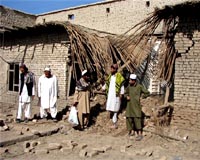| . |  |
. |
Washington (AFP) March 23, 2010 The United States is hoping Wednesday to show Pakistan the benefits of its cooperation against extremism, but it looks set to disappoint Islamabad on its ambitious goal of a civilian nuclear deal. President Barack Obama's administration has cautiously welcomed what it sees as a shift in Pakistan and is looking to convince the country's public, where anti-Americanism runs rife, that it is committed to a long-term partnership. Pakistan's Foreign Minister Shah Mehmood Qureshi and General Ashfaq Kayani, head of the powerful army, will hold a first-of-a-kind "strategic dialogue" with US Secretary of State Hillary Clinton on Wednesday. Pakistan has come with a detailed wish-list in areas from improving access to water and energy to securing lethal drones. "We have a relationship that goes back 60 years, but I'm here to build a partnership," Qureshi said Tuesday at the Pakistani embassy. "And when you build a partnership, it has to be built on trust." Pakistan would like to forge an agreement to cooperate on civilian nuclear energy. A deal could help the developing country curb chronic blackouts -- and tacitly recognize Pakistan as the Islamic world's sole nuclear power. The United States forged a landmark nuclear agreement in 2008 with Pakistan's historic rival India. The two South Asian powers stunned the world with nuclear tests in 1998. "India and Pakistan, we have been in this together in South Asia, so what is good for India should be good for Pakistan," Pakistani Foreign Secretary Salman Bashir told reporters. US officials have publicly sidestepped the issue. Richard Holbrooke, the US special envoy for Pakistan and Afghanistan, said only that "we're ready to listen to anything." Asked by Pakistan's Express TV if nuclear cooperation could assuage the country's energy crisis, Clinton said there were "more immediate steps that can be taken" including upgrading power plants. Unlike in India's case, US officials have concerns about Pakistani proliferation. The father of Pakistan's bomb, Abdul Qadeer Khan, has admitted to leaking nuclear secrets to Iran, Libya and North Korea, although he later retracted his remarks. Pakistan is also seeking unmanned attack drones. The United States has so far only given Pakistan surveillance drones. The United States has launched more than 90 drone strikes in Pakistan since August 2008, killing more than 830 people, according to local sources. US officials say they have killed top Al-Qaeda and Taliban militants, but the Pakistani government bristles at the undercutting of its sovereignty. Pentagon spokesman Geoff Morrell downplayed expectations for major announcements, saying it was a mistake to see the dialogue as "a discussion of requests and replies." Qureshi and Kayani met Tuesday with Senators John Kerry and Richard Lugar, who authored last year's bill that promised 7.5 billion dollars in aid over five years to build Pakistan's infrastructure and democratic institutions. Many Pakistanis are distrustful of the United States, remembering how it distanced itself in the 1990s after teaming up with Islamabad to arm Islamic guerrillas who ousted Soviet troops from Afghanistan. Holbrooke said that the dialogue -- which will include working groups on Thursday and further rounds in Islamabad -- was part of a "strategic vision" by the United States. "That is that Pakistan is important in its own right. We don't view it simply as a function of its giant neighbor to the east or its war-torn neighbor to the west," Holbrooke said. Bashir said many Pakistanis had grown irritated by US calls for the country to do more against extremists. "Pakistan has done much more. We are doing it for our own sake," he said. "So I think it's perhaps best not to get into that argument." Pakistan in recent months has launched a major military offensive against homegrown Taliban and arrested prominent militants. But some have questioned Pakistan's motivations. The former UN envoy to Afghanistan, Kai Eide, said Pakistan's arrest of one top Taliban served to close secret communications aimed at reconciliation between the militant group and the Afghan government. "The main problem is that the United States and Pakistan are still far apart in terms of how they perceive the situation in Afghanistan," said Lisa Curtis, a South Asia expert at the Heritage Foundation think-tank. "The US is of course seeking to ensure the Taliban cannot return to power, while Pakistan is mainly interested in limiting Indian influence."
Share This Article With Planet Earth
Related Links News From Across The Stans
 US missile strike kills six in NW Pakistan: security officials
US missile strike kills six in NW Pakistan: security officialsMiranshah, Pakistan (AFP) March 23, 2010 Missiles fired from US drones Tuesday killed at least six militants in a restive Pakistani tribal area bordering Afghanistan, security officials said. "US drones fired two missiles on a militant vehicle parked outside a compound. At least six militants were killed and three others were wounded," a senior security official told AFP. "The compound, being frequented by militants recently, w ... read more |
|
| The content herein, unless otherwise known to be public domain, are Copyright 1995-2010 - SpaceDaily. AFP and UPI Wire Stories are copyright Agence France-Presse and United Press International. ESA Portal Reports are copyright European Space Agency. All NASA sourced material is public domain. Additional copyrights may apply in whole or part to other bona fide parties. Advertising does not imply endorsement,agreement or approval of any opinions, statements or information provided by SpaceDaily on any Web page published or hosted by SpaceDaily. Privacy Statement |